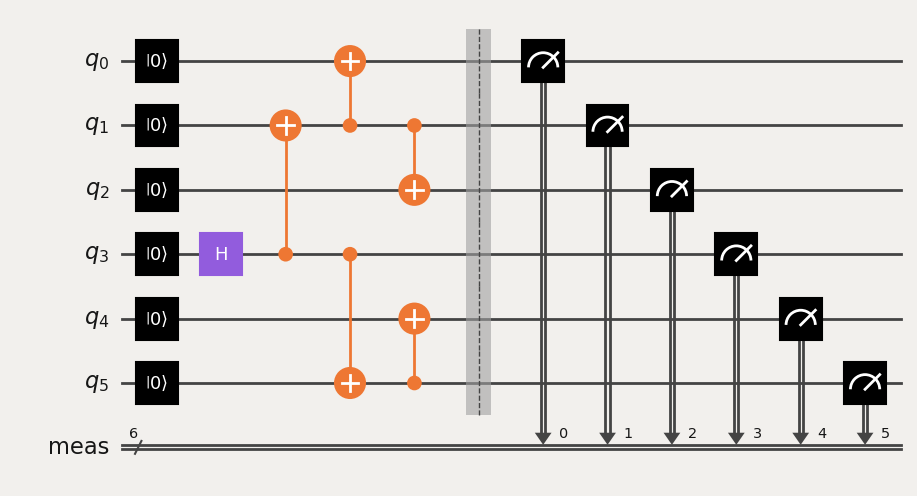Basic usage¶
Using M3 involves three steps (steps one and two can usually be done in reverse order if desired).
Select a system and calibrate over the desired set of qubits.
Run the circuit(s) of interest on the system.
Apply the readout correction and post-process.
Simple example¶
Here we use a noisy simulator to perform the three steps above. First we import the needed modules, and construct a circuit of interest.
import numpy as np
from qiskit import *
from qiskit_ibm_runtime.fake_provider import FakeCasablancaV2
import mthree
qc = QuantumCircuit(6)
qc.reset(range(6))
qc.h(3)
qc.cx(3,1)
qc.cx(3,5)
qc.cx(1,0)
qc.cx(5,4)
qc.cx(1,2)
qc.measure_all()
qc.draw('mpl')

Next we calibrate an M3 mitigator instance over qubits 0 -> 6 (Step #1):
backend = FakeCasablancaV2()
mit = mthree.M3Mitigation(backend)
mit.cals_from_system(range(6))
[<qiskit_aer.jobs.aerjob.AerJob at 0x7fc870fd8b60>]
Transpile and execute our circuit (Step #2):
trans_qc = transpile(qc, backend)
raw_counts = backend.run(trans_qc).result().get_counts()
Finally, apply the correction and post-process (Step #3). Here our post-processing is simply computing the expectation value from the returned quasi-probabilities:
quasis = mit.apply_correction(raw_counts, range(6))
print('Expectation value:',quasis.expval())
Expectation value: 0.9140434265136719
Specifying qubits to mitigate over¶
The circuit above also fits on other systems without SWAP mapping provided that we select the correct layout.
from qiskit_ibm_runtime.fake_provider import FakeMontrealV2
backend = FakeMontrealV2()
mit2 = mthree.M3Mitigation(backend)
In our case, qubits = [10, 12, 15, 13, 11, 14] is an appropriate layout. Importantly, the
zeroth entry of the list tells us what physical qubit is readout to generate bit 0 in the output
bit-strings. We must pass this list to both the calibration and correction steps of M3.
qubits = [10, 12, 15, 13, 11, 14]
mit2.cals_from_system(qubits)
trans_qc = transpile(qc, backend, initial_layout=qubits)
raw_counts2 = backend.run(trans_qc).result().get_counts()
quasis2 = mit2.apply_correction(raw_counts2, qubits)
print('Expectation value:',quasis2.expval())
Expectation value: 0.976810097694397